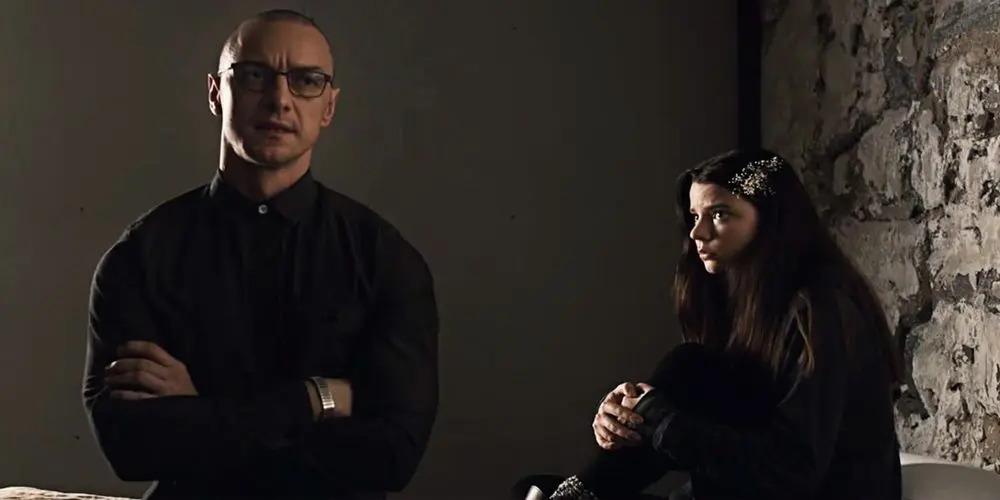We review the 2016 film Split, which does not contain any significant spoilers.
Everyone loves a comeback story. In sports, in the movies, in life; we enjoy seeing someone get beaten down and told they can’t until, eventually, they can. What was it that Rocky Balboa said? “It ain’t about how hard you can hit, it’s about how hard you can get hit, and keep moving forward.”
M. Night Shyamalan has been hitting himself harder and longer than most directors could survive. He’s coming back from Lady in the Water, The Happening, The Last Airbender, After Earth, and The Visit, which is a bit like coming back from being shot, stabbed, and buried alive. You can like one or all of those movies, but you can’t escape the fact that most people don’t. A Shyamalan return-to-form feels less like a comeback and more like reincarnation. Or a release from a decade-and-a-half of wacky psychiatric internment.
There was something about The Visit, his last movie before this one, that lent credence to that theory. It felt like he’d been away for a while. Like he was catching up. It presented a white kid rapping and found-footage horror as though they were bold and new, rather than tired and faintly embarrassing. Split, Shyamalan’s latest, feels different still. It feels like he’s finally caught back up again.
Split Review and Plot Summary
I’m as surprised as anyone. I was one of the few people who seemed to enjoy The Visit, but what I enjoyed most about it was how divorced it felt from the broader culture that Shyamalan’s movies used to be at the centre of. He was working with a lower budget and even lower expectations, which obviously helped. You could feel him respond to the challenge of trying to regain his form under those restrictive conditions. And, in fairness, he did manage to open up the format and do something fairly effective with it.
But The Visit wasn’t a flat-out good movie the way Split is, and people didn’t respond to it the way they’re responding to this one. This is the comeback. We know Shyamalan’s partial to a twist, but that his resurgence is a genre movie released in the wastelands of January might be the best he’s ever come up with.
Given the title, it’s hardly surprising that Split mines the misinformation surrounding dissociative identity disorder for its premise. James McAvoy plays a deeply disturbed kidnapper named Kevin with 23 distinct personalities, who stuffs his creepy subterranean lair with three young women who he’s keeping around for initially-mysterious purposes.
Two of the girls are played by Haley Lu Richardson and Jessica Sula, but the one who matters is a standoffish loner brought to life by Anya Taylor-Joy, who you’ll remember as the only good part of Robert Eggers’ The Witch. I probably shouldn’t have to say this given who we’re talking about here, but Split is not a sensitive and measured portrayal of mental illness, and while that didn’t bother me personally, that Shyamalan is literally making up facets of a legitimate psychiatric disorder to suit his narrative purposes is going to seriously piss some people off.
Yes, I know, it’s just a movie and it shouldn’t be taken all that seriously, but there’s a strong likelihood that highly-fictionalized and insensitive portrayals of real-life issues and conditions probably make life even harder for people who struggle with them. I’m just saying.
What’s undeniable though is that Shyamalan’s loose understanding of DID makes for a hell of horror-movie conceit. The girls aren’t just dealing with one nemesis, but twenty-three separate ones, each with their own distinct personalities, accents and agendas.
The most common are Dennis, a steely obsessive-compulsive control freak, and Patricia, a slightly-crazy church lady, who together embody the mother and father of McAvoy’s internalised family of identities. Their child is a lisping, sinister nine-year-old named Hedwig. He’s creepy in a way that only a grown man asking for kisses can truly be.
McAvoy’s bald and ripped here, which becomes an eerie constant of all the characters he ends up playing, including the women and children. Sometimes a visual cue gives away who he’s supposed to be (a tightly buttoned-up shirt means Dennis; a shawl means Patricia), but just as often it’s not immediately apparent, to the audience, his captives or, at several points, his therapist, Dr Fletcher (Betty Buckley).
Shyamalan often cuts away to these wordy scenes in Dr Fletcher’s quaint home-office, where Kevin adopts the personality of Barry, a likeable, presumably-gay fashion designer, while Dr Fletcher continuously battles not just Kevin’s wavering sanity but also the scepticism of her colleagues. See, the good doctor has a long-held belief that people who suffer from DID are capable of transforming themselves not just psychologically but also physiologically, and she sees Kevin as proof of this theory. Which is troubling because the one thing all Kevin’s personalities seem to share is a mutual fear of a hypothetical twenty-fourth personality, whom they have named “The Beast”, and whom they all insist is literally a man-eating monster. Wherever could this be going?
Don’t worry. That isn’t the twist. All of this flagrant narrative absurdity is treated as inevitable, and it’s really just a series of hooks on which to hang a creepy, exactingly well-executed psychological thriller. These days Shyamalan is best-known for his pretentious auteurist nonsense, but the fact remains that he’s an extraordinarily gifted director of schlocky suspense, and his material has a habit of teasing out great performances. We get two here: McAvoy’s, obviously, which is the best of his career and reason enough to see the movie on its own, but also Taylor-Joy’s, who has a remarkable screen presence and perhaps, when asked to show more range, could become Hollywood’s next great young actress.
Is the movie Split good?
There are problems, of course. For all his talents as a shot-maker and a builder of suspense, Shyamalan has never been a particularly great writer, and the scenes with Dr. Fletcher are so leaden with ham-fisted exposition that they’re impossible to take even halfway seriously. More egregious is a running subplot, told in flashback, that’s supposed to explain why the heroine is better-suited to deal with the issue at hand than her fellow captives, but it ultimately just ends up feeling exploitative and unpleasant in a way that’s quite arbitrary; inappropriate, tonally-askew deviations being yet another item on the long list of things a Shyamalan picture seemingly must include.
Still, on balance, Split is an extremely distinguished variety of lurid B-movie pulp, and it’s absolutely the best Shyamalan movie since Unbreakable. And the ending? Jesus fucking Christ. You wouldn’t believe me even if I told you.
What did you think of the 2016 movie Split? Comment below.




